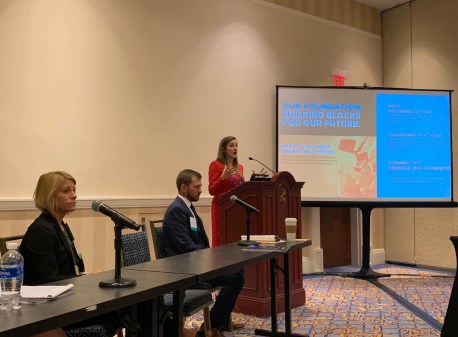Citizen engagement and collaboration critical to developing smart cities, tech officials say

WASHINGTON, D.C. — When it comes to making a city smart, three of the nation’s top city technologists say citizen collaboration is critical.
At Smart Cities Week, an event led by the Smart Cities Council, panel members from Chicago, New York City and Louisville, Kentucky, discussed on Sept. 28 the crucial and increasing role their citizens have played in the deployment of experimental technology.
Chicago’s Chief Information Officer, Brenna Berman, said she initially feared citizens would not support the city’s Array of Things (AoT), a 500-node sensor network designed to track Chicago’s environment, infrastructure and activities because of potential privacy concerns. But the network of cameras and microphones, scheduled for completion by 2018, received reaction from citizens the city’s c-level executives didn’t expect.
“Not many people asked about privacy concerns,” Berman said. “Their concern was ‘Why aren’t we using this for surveillance?’ That’s not what it is designed for. This is a data capturing research platform.”
Berman credits the public’s supportive response to “very heavy upfront communication, in-person and multi-channel engagement with residents for about six months before installation.” Berman added that “engagement continues now that the nodes are in place and people can see them.”
Through the AoT project, Berman said her agency will publish all of the collected data in an attempt to support application development and urban asthma research.
Director of Innovation for New York City Jeff Merritt, reported a similar anecdote. A $5 million gunshot detection system, intended to improve the safety of citizens in all five boroughs, has also been well-received by the public, Merritt said, despite the potential backlash inherent in any project where the government installs surveillance equipment in public areas.
“We took a very data-driven approach,” Merritt said. “In particular, [we were] focusing on the statistics that about 75 percent of all gunshots are not reported to 911. So if we want to be able to respond to these gunshots rapidly there has to be an alternative to 911.”
Merritt said the project’s pilot was very successful because city police were able to respond faster to shootings and could aggregate information from the detectors and establish trends.
“It’s a very expensive program,” Merritt said. “It’s very much in communities and it’s very much in your face. It’s actually recording audio in communities, and [has been] very well received.”
Merritt said he believes the positive response from citizens was largely thanks to of an open channel of communication between residents, law enforcement and city officials.
The city, Merritt explained, informed the public that the sensors were only being used to detect gunshots, allaying fears that the equipment might be used for some nefarious purpose, like listening to the public’s conversations.
Ted Smith, former chief innovation officer of Louisville, Kentucky, also recounted a case of citizen engagement as the city deployed one of its best-known data projects, AirLouisville, in which GPS-enabled asthma inhalers were distributed to identify air quality issues throughout the city.
“What that technology has enabled us to do [was] identify where hot spots were,” Smith said.
The project equipped those who suffer from asthma with information they can use to plan their travels, avoiding areas where they know the air might trigger an attack. The project’s pilot participants saw a 79 percent reduction in asthma issues, Smith said.
“We couldn’t do it without citizens donating their data,” Smith said. “They understand that they’re sharing it with everybody else and that is a very transparent process and that we can all look at the data.”
AirLouisville is to continue thanks to continued grant funding. Soon, Smith and his team are scheduled to deploy inhalers to more than 1,000 additional residents.





